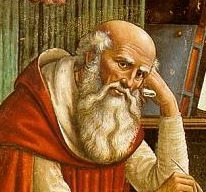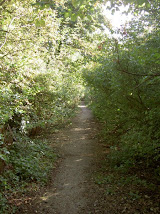Thanks to everyone who commented on my last 'blog post. It gave me much to think about, especially nuancing my thoughts about the relationship between Truth and Fact. Don't worry Aleatha, role-playing is but one symptom of the disease, and this 'blog is primarily about the disease. At its best role-playing reflects the hero (or heroine) in us all and therefore is part of the longing for home, but that is only at its best. The rest of the time it is just something fun to do with friends. There will be posts primarily about role-playing, but most of them will about the larger world of fantasy. Of course, not all them will be as good as last week's--I was in pretty good form while writing it, something I'm sure I won't be for every post. Regardless, I appreciate you all for reading and thinking about what I have to say.
Well, it has been a couple of weeks since we last wrote--I would feel bad about this, but I have been writing my Master's Thesis and am currently reviewing for my tests, including tests for classes taken at the beginning of the school year. Ah, Oxford. However, since it is Saturday morning (GMT), I am taking a break to write a little bit in this 'blog.
Today we are talking less about the theory of fantasy and talking a little bit more about specifics. Specifically, we are talking about that element which helps make fantasy unique among other genres, which is to say magic. In fact, an article I read on Pyramid argued that fantasy wasn't really a genre so much as other genres with the inclusion of magic. Thus, a world like J. K. Rowling's Harry Potter is the school days story (very popular here in the U.K.) with the inclusion of magic. It was an interesting idea (although I'm not sure it follows--since magic is inherent in myth, strongly mythic fantasy stories, such as Prof. Tolkien's work don't really fit the magic+genre model). As an idea, however, it works nicely, especially working from our observation that a magic system can be an important part of what makes a fantasy book unique and fresh.
One of my favourites is found in Robert Jordan's Wheel of Time series, which was discussed briefly here by my wife. Every criticism laid against these books: that were overwritten, over-long, et cetera, was on some level valid, but that does not diminish Robert Jordan's status as a Master of Fantasy. There are a lot of reasons for this, primarily found in the richness of his world, but of the reasons is surely the wonderful magic system he created. In The Wheel of Time, magic-users channel the One Power, which is divided into two parts, the male half or saidin and the female half or saidar. The real beauty in this system is the way that gender really matters. A user of saidin (the male half, you remember) has to struggle with and overcome the power of saidin in order to be able to use it, while a user of saidar must open up to the power and be calm and responsive. In order to wield to One Power to its most effect, a saidar user and a saidin user must be linked together, so that the man has to submit and the woman has to overcome, bringing the two sexes together. It is like The Magic Flute (Freemasonry and Mozart--what isn't to like? The Magic Flute deserves a post all its own), only with more explosions.
"There is nothing more noble than a wife and a husband. A man and a woman and woman and man reach upward Towards and attain godhood."
--Mozart, The Magic Flute, Act 1 scene 14.
There are a class of fantasy books, alluded to above, where the magic system isn't really explicated in the text. Most of these are those books I term mythological fantasy and includes J. R. R. Tolkien's The Lord of the Rings, C. S. Lewis' The Chronicles of Narnia, Susan Cooper's The Dark is Rising, and Lloyd Alexander's Prydain Cycle. The magic in these particular books serves, as in the myths upon which they are based, essentially as a plot element, and is usually more a pervasive element than a system. Part of this comes from the fact that in this kind of world, usually the heroes are not able to use magic, and so there is no need for explication (The Dark is Rising is an obvious exception, but I am saving my discussion of that series for another post).
Middle Earth is a good example of this: Gandalf is a wizard, and we know he can cast spells, and he often does so in the books, whether setting pine cones on fire, or shutting the door on the Balrog or trying to open doors at Moria. Such things, however, are beyond the ken of simple hobbits and are thus only referenced in passing. Even more compelling than the spell magic in Tolkien is the ambient magic. Thus when Sam asks if his rope from the elves is magical and they don't know what it means, only that it is well-made according to their craft. Bard Bowman can speak to birds as a heritage of his birth. Much of what Aragorn does (healing, hiding, et cetera) is 'magical' but is not spells per se.
The other good example of this Narnia. Again, none of the main characters use magic, although it is referenced constantly, including sorcery--I have always loved "the circle of blue fire" from Prince Caspian. In fact, I think more than anything, the magic in Narnia is evocative. I actually made (or started to make) a character in the role-playing game Mage: The Awakening based on Narnia magic. The quote which inspired me:
"It means," said Aslan, "that though the Witch knew the Deep Magic, there is a magic deeper still which she did not know. Her knowledge goes back only to the dawn of Time. But if she could have looked a little further back, into the stillness and the darkness before Time dawned, she would have read there a different incantation." -The Lion, the Witch and the Wardrobe
I have always loved the idea of the Deeper Magic from before the dawn of time. However, because the magic is there to make a point, we never get any more than that.
My favourite wizard in fantasy (although not my favourite magic system) is Shmendrick from The Last Unicorn. I have always identified with him, for a number of reasons, and he is one of the reasons I love that book so much. I suppose it his combination of immortality, incompetence, and good humour that appeal to me.
So, what are your favourite descriptions of magic from books? Any favourite magical characters? Tell me what you think.
"Do not meddle in the affairs of wizards, for they are subtle and quick to anger."
"Do not ask the elves for advice for they will tell you both yes and no."
-A pair of proverbs from Middle Earth
Sunday, June 01, 2008
Subscribe to:
Posts (Atom)

